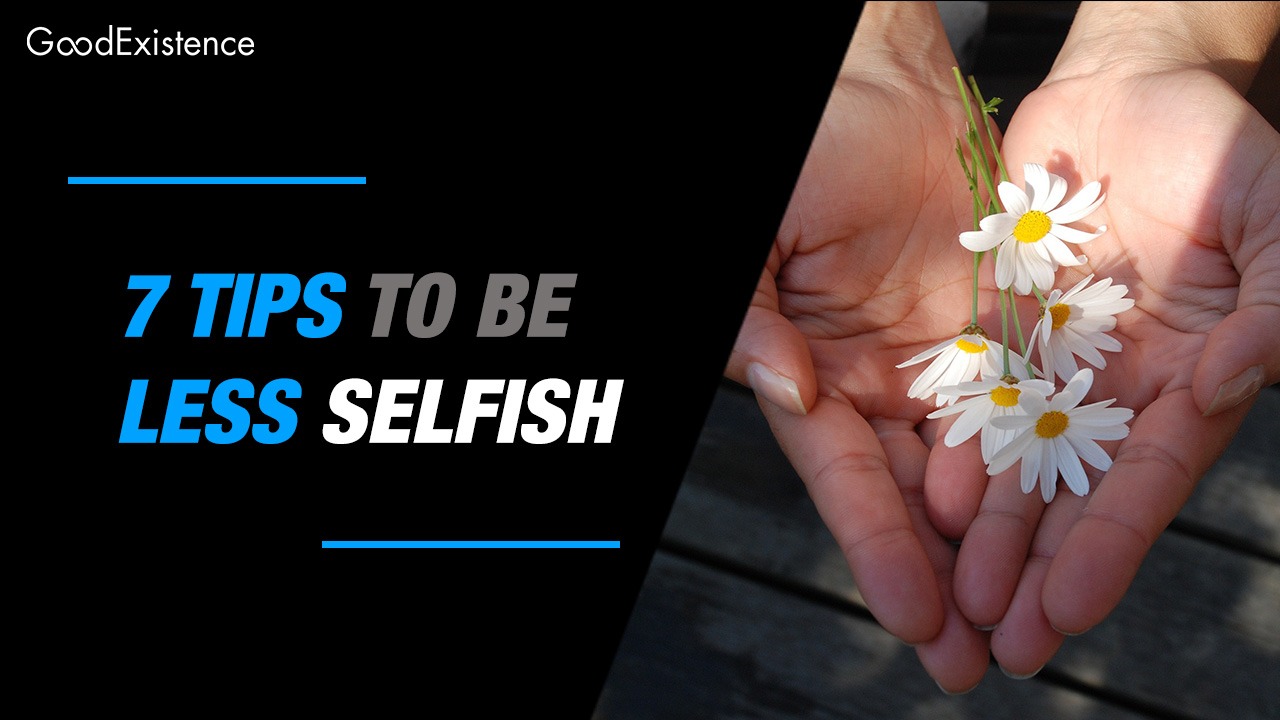We all have some level of selfishness in us, but sometimes it can go too far, causing harm to ourselves and others. Being selfish can lead to negative consequences, such as lost relationships, loneliness, and dissatisfaction in life. However, the good news is that it is possible to be less selfish and still be happy. In this article, we will explore seven tips to help you become less selfish and find happiness.

Alright, so let’s get started with the first tip:
1. Practice empathy

Empathy is the ability to understand and share the feelings of others. It is an essential skill to have if you want to be less selfish. When you practice empathy, you become more attuned to the needs and feelings of others, which can help you become less self-centered.
To practice empathy, try to put yourself in other people’s shoes. Ask yourself how they might be feeling and why. Listen to them without judgment and try to understand their perspective. This can help you build stronger relationships and improve your overall emotional intelligence.
2. Give back

Giving back to others can help you become less selfish and more connected to the world around you. When you volunteer your time or resources to help others, you become more aware of the needs of others and less focused on your own wants and desires.
Giving back can take many forms, such as volunteering at a local charity, donating money to a cause you believe in, or simply helping a friend in need. Whatever form it takes, giving back can help you feel more fulfilled and improve your overall well-being.
3. Practice gratitude

Gratitude is the practice of being thankful for what you have, rather than focusing on what you don’t have. When you practice gratitude, you become more aware of the positive aspects of your life, which can help you feel more content and less selfish.
To practice gratitude, try to make a habit of writing down three things you are grateful for each day. This can help you focus on the positive aspects of your life and become more aware of the good things that you may be taking for granted.
4. Be present

Being present means being fully engaged in the moment and paying attention to what is happening around you. When you are present, you become less focused on yourself and more aware of the world around you.
To be present, try to focus on the moment, rather than worrying about the past or future.
Pay attention to your surroundings and the people around you. This can help you become more empathetic and less self-centered.
Recommended read: How to Leave The Past Behind
5. Practice mindfulness

Mindfulness is a popular practice that involves paying attention to the present moment with an attitude of openness and non-judgment. However, as Christians, we can take this practice a step further by incorporating our faith into it. Instead of just focusing on our thoughts and emotions, we can turn our attention towards God and His presence in our lives.
One way to practice mindfulness with a Christian view is to spend time reflecting on God’s word. This can involve reading a passage from the Bible, meditating on its meaning, and praying for guidance in applying it to your life. By doing this, you can cultivate a deeper understanding of God’s teachings and develop a stronger connection with Him.
Another way to practice mindfulness with a Christian view is to seek God’s presence in prayer. This can involve setting aside time each day to pray, whether it’s through silent meditation, reciting prayers, or speaking to God in your own words.
By doing this, you can develop a sense of peace and serenity as you focus on God’s love and guidance.
In summary, practicing mindfulness with a Christian view involves turning your attention towards God and seeking His presence in your life. By reflecting on His word and seeking Him in prayer, you can deepen your connection with God, increase your awareness of His presence in your daily life, and find peace in His love and grace.
Check out: The Power of Prayer and see 12 benefits of daily praying.
6. Set boundaries

Setting boundaries is an essential part of being less selfish. When you set boundaries, you are communicating to others what you are willing and not willing to accept in your life.
This can help you become more assertive and less likely to put your own needs before others.
To set boundaries, try to communicate your needs clearly and assertively. Let others know what you are willing and not willing to accept in your life. This can help you become more self-aware and less selfish in your relationships.
7. Seek Feedback

Asking for feedback from others is a great way to become more self-aware and understand how your actions affect those around you. When seeking feedback, it’s important to be open to criticism and not become defensive or dismissive of what others have to say.
Feedback is the breakfast of champions. Ken Blanchard
Feedback can come from a variety of sources, such as friends, family, colleagues, or even strangers. You can ask for feedback on specific actions or behaviors, or you can ask for a more general assessment of how you come across to others.
For example, if you tend to dominate conversations, you could ask a friend for feedback on whether they feel you listen to them enough.
It’s important to remember that feedback is not always easy to hear, and it can sometimes be difficult to accept. However, it’s important to approach feedback with a growth mindset and use it as an opportunity for self-improvement.
Final Words
Being less selfish is a journey that takes time and effort, but it’s worth it for the positive impact it can have on your relationships and your own sense of well-being.
By practicing empathy, gratitude, and self-awareness, setting boundaries, seeking feedback, and other strategies, you can become more selfless and find happiness in contributing to others.
Remember to be patient with yourself, as changing deeply ingrained habits can be difficult, but with consistent effort and a growth mindset, you can become a more selfless and happier person.
Ways to Be Less Selfish – FAQ
Is it possible to be selfless and still be happy?
Yes, it is possible to be selfless and still be happy. In fact, being selfless can bring a great sense of fulfillment and joy, as it allows us to contribute to something bigger than ourselves and make a positive impact on others.
How can I be less selfish in my daily life?
To be less selfish in your daily life, try to focus more on others and their needs. This can involve actively listening to others, volunteering your time or resources, and being willing to compromise in your relationships.
How can I overcome my selfish tendencies?
Overcoming selfish tendencies takes time and effort, but it’s possible with the right mindset and approach. Some strategies include practicing empathy, being grateful, setting boundaries, and seeking feedback from others.
Can being less selfish improve my relationships?
Yes, being less selfish can improve your relationships. When you’re less focused on your own needs and more focused on others, you’re likely to build stronger connections and foster more meaningful relationships.
See also in Personal Growth
25 Ways to Build Charisma
I Don’t Have a Passion, and Honestly, I’m Kinda Freaked Out
10 Ways to Build Resilience After Setbacks
15 Ways to Develop a Strong Work Ethic
15 Team Building Skills for Success
25 Interview Skills That Get You Hired